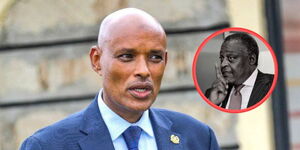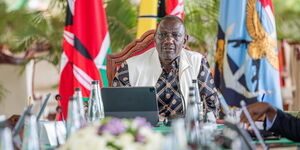It is the dream of every Kenyan to land a government job since they are believed to be lucrative, offer security of tenure, compensation in case of retrenchment, allowances and pension.
For years, thousands of youths roam in search of these jobs. Data from the Kenya National Bureau of Statistics (KNBS) indicates that the unemployment rate stands at 7.2 per cent as of September 2020.
Nonetheless, one government job whose salary details remain scanty has failed to attract the millions of job seekers in Kenya.
Reports indicate that the government has advertised the hangman’s job over ten times. The job has been listed under the Kenya Prison Service, a department within the Ministry of Interior and Coordination of National Government.
“Since 1987, no Kenyan has been hanged. That is true. Do you know why? This is because since the hangman retired from Kamiti Prison, the job has been advertised more than ten times now.
"The government cannot get a good hangman to employ at Kamiti Maximum Prison to be hanging people,” Paddy Ahenda, former Kasipul Kabondo Member of Parliament stated in 2007 while rallying MPs to amend the Penal Code and abolish the death sentence.
Kenya’s last hangman, Kirugumi Wa Wanjiku, passed away on November 2, 2009, 22 years after hanging Hezekiah Ochuka and Pancras Oteyo, two former Kenya Airforce officers who were accused of staging the attempted coup in 1982.
These two were notably the last Kenyans to be hanged in 1987 for treason.
Kirugumi reportedly succumbed to pneumonia but died a lonely and desolate man in a small village in Aberdare Ranges.
“Inmates had to be clean before they went to the gallows. We had to ensure that their nails were well-trimmed, their hair clean-shaven and bodies clean. Work is work and if you are told to do it, you have to do it," he stated in a past interview.
His son, Ndung’u Kirugumi, however, argued that his father was a prison ranger and not the government hangman. Ndung’u alleged that the hangman came from Zimbabwe and would be summoned on the D-day.
“Immediately the executioner arrived, the sirens at Kamiti would be turned on and he would be let through the gates without being subjected to a security search. Everyone at the prison, even the warders, was required to turn their backs when he was passing by so his identity could remain concealed.
“The siren was a general notification to heed this directive. Not even my father knew who he was, even after working at the prison for almost 50 years,” he stated.
Capital Punishment, Repeal of Death Penalty and Prerogative of Mercy
Capital punishment is still practised in the country and is still provided for under the Laws of Kenya. In November 2020, The 2016 Miss Langata beauty queen - Ruth Kamande Wanjiku - was sentenced to death after the Appellate Court rejected her appeal.
High Court Judge, Jessie Lessit, had sentenced Kamande to death in 2017, ruling that the prosecution had proven beyond a reasonable doubt that she was guilty of killing her boyfriend by stabbing him 22 times in September 2015.
In 2016, President Uhuru Kenyatta invoked Article 133 of the Constitution, officially commuting the death sentence to life imprisonment. Uhuru invoked the Power of Mercy and also signed a pardon warrant, releasing 102 long-term convicts.
Kenya’s 3rd President, Mwai Kibaki, had invoked the Prerogative of Mercy and also commuted the death penalty to life in prison on August 4, 2009. By invoking Article 133, Uhuru officialised the directive.
In December 2017, Justice Njoki Ndung'u declared the mandatory death sentence unconstitutional. The Supreme Court Judge ruled that the section "is out of sync and cannot stand as it is inconsistent with the Constitution".
Justice Njoki issued the landmark ruling following a petition by two death row convicts Francis Murwatetu and Wilson Thrombus, famously known as The Muruatetu Case.
The Supreme Court of Kenya did not abolish the death sentence but rather gave courts the discretion of sentencing similar cases on an individual basis.
The Muruatetu Case
With the case being open to interpretation, confusion ensued as thousands of inmates relied on the case to get lesser sentences. The lower court also referred to it in other offences including sexual related cases and robbery with violence.
On July 6, 2021, Chief Justice Martha Karambu Koome - in her inaugural sitting - directed that the Muruatetu case cannot be applied to any other cases except murder trials. She added that the jurisprudence is only applicable in cases where the accused are given the mandatory death sentence, as provided under Sections 203 and 204 of the Penal Code.
“To clear the confusion in regard to the mandatory death sentence in offences other than murder, we direct in respect of other capital offences such as treason and robbery with violence, that a challenge of those sentences should be properly filed in court,” the court ruled, offering a lifeline to convicts who had been handed the mandatory death sentence.
The directive allowed them to file appeals and get new sentences.
International Push to Abolish Death Penalty
Human rights agencies, governments, activists are constantly and concertedly lobbying for the abolition of capital punishment. This is evidenced by the passage of the Second Optional Protocol to the International Covenant on Civil and Political Rights, Aiming at the Abolition of the Death Penalty.
The European Union, through its Protocols No. 6 and 13 also amended the EU Convention on Human Rights.
In Africa, nearly 23 countries have abolished the death penalty. These include Sierra Leone, Cape Verde, the Republic of Congo, Madagascar, Malawi and Chad. Only two countries in East Africa have abolished the death penalty.
These are Rwanda and Burundi. The Rwandan Parliament voted to abolish capital punishment in 2007 while Burundi abolished the death penalty in 2009. Ironically Burundi voted against the UN Moratorium on the Death Penalty in 2016.












